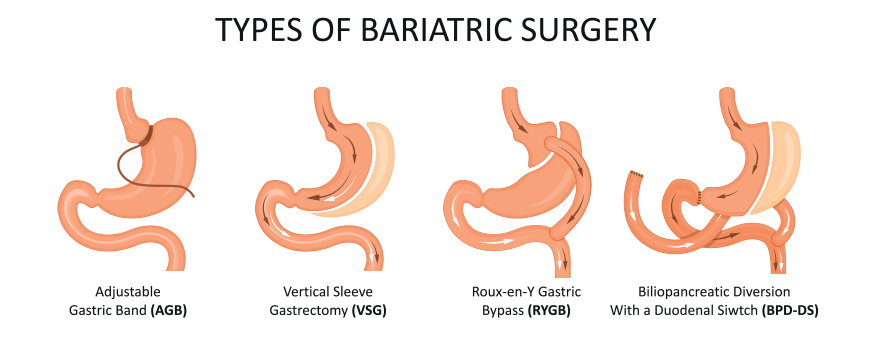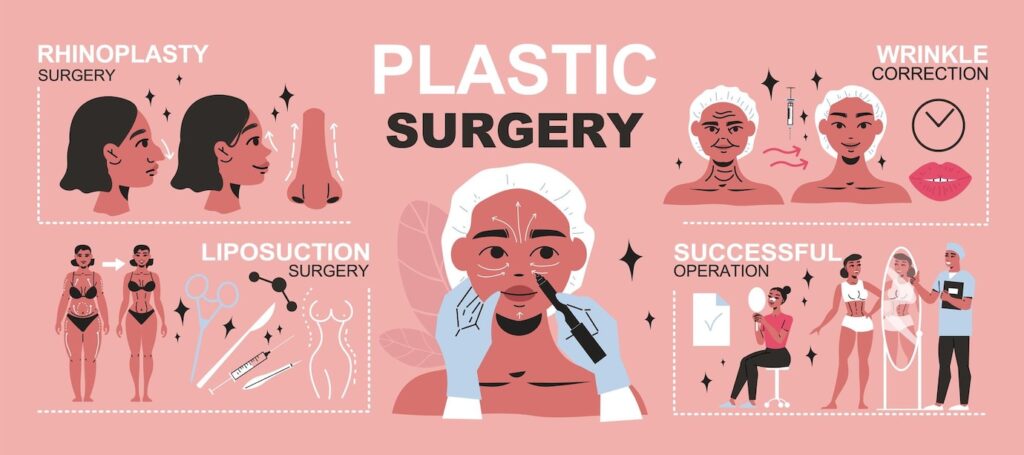The average cost of bariatric surgery in the United States is around $22,000, but the prices in Iran are still much cheaper. The cost of gastric sleeve surgery in Iran is about $3000, and the cost of gastric bypass surgery in Iran is about $3200, which includes medicine, surgery, hospital stay, and pre and post-op tests. This operation requires you to stay here for at least 7 to 10 days, and you will be in the hands of the best bariatric surgeons in Iran in the best hospitals.
Bariatric surgeons in Iran can make your body more appealing. Bariatric surgeons in Iran can also help you in making your final decision about what type of Bariatric is more suitable for you.
It is important that you seek the assistance of experienced and skilled Bariatric surgeons in Iran who have provided a suitable condition for people with limited budgets to do Bariatric in Iran easily. It is worth explaining that the quality provided by Iranian surgeons is far higher than other countries including Turkey and India.
Bariatric surgeons in Iran, have performed numerous procedures annually which make Bariatric surgeons in Iran more experienced than other countries’ plastic surgeons, due to high demand and low costs of Bariatric in Iran, thousands of people travel to Iran every year in a way that you can perform Bariatric in Iran by the best Bariatric surgeons with affordable and reasonable price.
Because of performing a great number of procedures, they become knowledgeable and highly skilled which make them very famous worldwide.
It is of paramount importance that your surgeon be expert in various types of Bariatric.
We are happy to introduce a great number of Iranian surgeons who have all two above-mentioned features.

If you decide to have a Bariatric Surgery (weight loss surgery) in Iran, reading this article can improve your knowledge about cost of Bariatric Surgery in Iran to a great extent and help you to choose the best city and hospital to perform.
In this article we provide you with a comprehensive description of Bariatric Surgeries in Iran and the cost of Bariatric Surgery in Iran.

The following table describes general information about Bariatric Surgery in Iran including Bariatric Surgery cost in Iran, recovery time, and to name but a few.
| General Information | |
| Cost | $ 2400- 3700 |
| Anesthesia | General |
| Hospital Stay | 2 to 3 Days |
| Back to Work | 1 to 2 Weeks |
| Duration of Operation | 1-3 Hours |
| Minimum Stay in Iran | 7-10 Days |
Read more about : Diet after bariatric surgery
Read more about : Gastric sleeve surgery, Before and after Photo after 3 months
Iranian surgery is an online medical tourism platform where you can find the best Bariatric Surgeons and hospitals in Iran. The price of a Bariatric Surgery in Iran can vary according to each individual’s case and will be determined based on photos and an in-person assessment with the doctor. So if you are looking for the cost of Bariatric Surgery in Iran, you can contact us and get free consultation from Iranian surgery.



Arrival: We meet at the airport, take you to your hotel, and after some rest, the first appointment with your surgeon, X-ray or scans.
Arrival: We meet at the airport, take you to your hotel, and after some rest, the first appointment with your surgeon, X-ray or scans.


Aftercare and resting time, take your medication and do nose drops.
You have all day to yourself (you can go shopping, sightseeing walking, etc)


You have all day to yourself (you can go shopping, sightseeing walking, etc)
You have all day to yourself (you can go shopping, sightseeing walking, etc)


Second visit with the Doctor, removing the stitches and receiving instructions.
Departure

Bariatric surgery in Iran is an operation that helps you lose weight by making changes to your digestive system. Some types of bariatric surgeries make your stomach smaller, allowing you to eat and drink less at one time and making you feel full sooner. Other bariatric surgeries also change your small intestine—the part of your body that absorbs calories and nutrients from foods and beverages.
Bariatric surgery in Iran may be an option if you have severe obesity and have not been able to lose weight or keep from gaining back any weight you lost using other methods such as lifestyle treatment or medications. Bariatric surgery in Iran also may be an option if you have serious health problems, such as type 2 diabetes or sleep apnea, related to obesity. Bariatric surgery in Iran can improve many of the medical conditions linked to obesity, especially type 2 diabetes.
Bariatric surgical procedures cause weight loss by restricting the amount of food the stomach can hold, causing malabsorption of nutrients, or by a combination of both gastric restriction and malabsorption. Bariatric procedures also often cause hormonal changes. Most weight loss surgeries today are performed using minimally invasive techniques and each surgery has its own advantages and disadvantages.
The most common bariatric surgery procedures are as follows:
. Sleeve Gastrectomy (Gastric Sleeve)
. Biliopancreatic Diversion with Duodenal Switch (BPD/DS)
What is Gastric Bypass Surgery?
Gastric bypass is a restrictive and malabsorptive weight loss surgery procedure. It restricts the amount of food you can eat and reduces the number of calories (and nutrients) you absorb from food. The Roux-en-Y Gastric Bypass – often called gastric bypass – is considered the ‘gold standard’ of weight loss surgery.
If you have high blood pressure or type 2 diabetes, gastric bypass surgery can make these conditions better, or even make them clear up completely. Up to six in 10 people with diabetes who have a gastric bypass find their sugar levels go back to normal after six years. Weight loss surgery may also make joint problems and breathing disorders, such as sleep apnea, better.
Read more about : Mini gastric bypass surgery side effects
Read more about : Mini gastric bypass surgery pros and cons
Read more about : How to tone up after gastric bypass?
The following table describes general information about Gastric Bypass Surgery in Iran including Gastric Bypass Surgery cost in Iran, recovery time, and to name but a few.
| General Information | |
| Cost | $ 3050 |
| Anesthesia | General |
| Hospital Stay | 2 to 3 Days |
| Back to Work | 1 to 2 Weeks |
| Duration of Operation | 2 to 3 Hours |
| Minimum Stay in Iran | 7-10 Days |
Advantages
. Produces significant long-term weight loss (60 to 80 percent excess weight loss)
. Restricts the amount of food that can be consumed
. May lead to conditions that increase energy expenditure
. Produces favorable changes in gut hormones that reduce appetite and enhance satiety.
. Maintenance of >50% excess weight loss
Disadvantages
. Is technically a more complex operation than the AGB or LSG and potentially could result in greater complication rates.
. Can lead to long-term vitamin/mineral deficiencies particularly deficits in vitamin B12, iron, calcium, and folate.
. Generally has a longer hospital stay than the AGB
. Requires adherence to dietary recommendations, life-long vitamin/mineral supplementation, and follow-up compliance.

Gastric Sleeve surgery also known as sleeve gastrectomy or vertical sleeve gastrectomy (VSG) is a weight-loss procedure that induces weight loss by restricting food intake. With this procedure, which is usually performed laparoscopically, the surgeon removes approximately 75-80 percent of the stomach. This results in the stomach taking on the shape of a tube or “sleeve” which holds much less food.
The treatment is widely considered around the world for helping people loose that extra fat. Gastric sleeve surgery restricts your food intake, which leads to weight loss. You may lose from 50 to 90 pounds.
It’s done as a laparoscopic surgery, with small incisions in the upper abdomen. Most of the left part of the stomach is removed. The remaining stomach is then a narrow tube called a sleeve. Food empties out of the bottom of the stomach into the small intestine the same way that it did before surgery. The small intestine is not operated on or changed. After the surgery, less food will make you full when eating.
The Gastric Sleeve originated as the restrictive part of the duodenal switch operation. In the last several years, it has also been used as a staging procedure prior to a gastric bypass or duodenal switch in very high risk patients. It has also been used as a primary, stand-alone procedure.
Read more about : Gastric sleeve surgery recovery time
| General Information | |
| Cost | $ 3000 |
| Anesthesia | General |
| Hospital Stay | 2 to 3 Days |
| Back to Work | 1 to 2 Weeks |
| Duration of Operation | 1 to 2 Hours |
| Minimum Stay in Iran | 7-10 Days |
Advantages:
. Can lead to significant weight loss (average of 66% of excess body weight)
. Can lead to significant improvement of obesity-related health conditions
. Doesn’t use a foreign object (like the gastric band) and doesn’t reroute the digestive tract (like the gastric bypass)
. Short hospital stays approximately 2 days and recovery time due to minimally invasive procedure
. Limits the amount of food that can be eaten
. Causes significant changes to digestive organs and hormones that result in reduced hunger and increased metabolism.
. Permanent (won’t need more surgeries or readjustments, like the gastric band)
Disadvantages:
. Requires lifelong dedication to specific diet and exercise routines
. Permanent (cannot be reversed)
. Can lead to vitamin deficiencies
Laparoscopic adjustable gastric banding (LAGB) Surgery
Read more about Gastric sleeve surgery
Gastric Balloon
What is Gastric Balloon?
Gastric balloon, also known as an intragastric balloon (IGB) or a stomach balloon, is one of the best weight-loss methods for overweight people. A major advantage of this method is that it is done without surgery and on an outpatient basis with a sleeping pill that is required for endoscopy. In this method, the anatomy of the gastrointestinal tract does not change and per patient’s request, it can be returned to its previous state by removing the balloon. This tool, along with a controlled diet, helps you to lose weight, get your body back in shape and improve your health.
What are the Advantages and Disadvantages of gastric balloon?
Pros:
. Less invasive, as it’s performed endoscopically (through the mouth) and doesn’t require a change in anatomy.
. It is quick and easy to place. Note: Some balloons require anesthesia to place.
. It results in weight loss.
. Device is temporary; procedure can be reversed if desired
. It may result in long-term weight loss when used in conjunction with a diet and exercise program.
. You may feel full quicker and be less hungry while the balloon is in place.
. Quicker procedure (takes less than 30 minutes vs. about 100 minutes for the gastric sleeve)
. Quicker recovery
. Less serious complications compared to invasive surgeries
. Can be performed on patents with a lower BMI
. More affordable weight-loss option
Cons:
. Lower percentage of average weight loss
. Less effect on obesity-related conditions since less weight is lost
. Require diet and exercise discipline to be truly effective
. May take longer to see weight loss results
. Acid reflux is common. Prilosec or other anti-reflux medications are often prescribed.
. Nausea and vomiting are very common during the first few days.
. Vomiting after eating for the first few weeks is not uncommon.
. It is temporary. How will you keep the weight off after the balloon is removed?
. Stomach cramps are common.
. Difficulty sleeping may occur. Sleep disturbances may be related to an uncomfortable stomach or acid reflux while laying down.
. Acute pancreatitis is a rare risk from an overfilled saline balloon.
. Gastric balloon could deflate
. May experience bowel obstruction due to the migration of an IG
What is Laparoscopic adjustable gastric banding (LAGB)?
The Adjustable Gastric Band – often called the band – involves an inflatable band that is placed around the upper portion of the stomach, creating a small stomach pouch above the band, and the rest of the stomach below the band.
The following table describes general information about Laparoscopic adjustable gastric banding Surgery in Iran including Laparoscopic adjustable gastric banding Surgery cost in Iran, recovery time, and to name but a few.
| General Information | |
| Cost | $ 1800-3000 |
| Anesthesia | General |
| Hospital Stay | 1 to 2 Days |
| Back to Work | 1 Week |
| Duration of Operation | 1 Hour |
| Minimum Stay in Iran | 7 Days |
Advantages
. Reduces the amount of food the stomach can hold
. Induces excess weight loss of approximately 40 – 50 percent
. Involves no cutting of the stomach or rerouting of the intestines
. Requires a shorter hospital stay, usually less than 24 hours, with some centers discharging the patient the same day as surgery.
. Is reversible and adjustable
. Has the lowest rate of early postoperative complications and mortality among the approved bariatric procedures.
. Has the lowest risk for vitamin/mineral deficiencies
Disadvantages
. Slower and less early weight loss than other surgical procedures
. Greater percentage of patients failing to lose at least 50 percent of excess body weight compared to the other surgeries commonly performed.
. Requires a foreign device to remain in the body
. Can result in possible band slippage or band erosion into the stomach in a small percentage of patients.
. Can have mechanical problems with the band, tube or port in a small percentage of patients.
. Can result in dilation of the esophagus if the patient overeats
. Requires strict adherence to the postoperative diet and to postoperative follow-up visits.
. Highest rate of re-operation
. Return to top
Read more about : Bariatric surgery risks
Read more about : Bariatric surgery side effects
Read more about : Coolsculpting after bariatric surgery
The Biliopancreatic Diversion with Duodenal Switch – abbreviated as BPD/DS – is a procedure with two components. First, a smaller, tubular stomach pouch is created by removing a portion of the stomach, very similar to the sleeve gastrectomy. Next, a large portion of the small intestine is bypassed.
BPD/DS is generally performed as a single procedure however, in select circumstances, the procedure may be performed as two separate operations — sleeve gastrectomy followed by intestinal bypass once weight loss has begun.
Why it’s done
Healthcare providers may recommend the BPD/DS to people who are severely obese. These people usually have a body mass index (BMI) of 50 or greater or a BMI of 40 or greater with serious type 2 diabetes and other serious health problems. These health problems include:
. Type 2 diabetes
. Sleep apnea
. Heart disease
. Lung disease
. High blood pressure
. High cholesterol
. Nonalcoholic fatty liver disease
A BPD/DS is typically done only after you’ve tried to lose weight by improving your diet and exercise habits.
Read more about : Bariatric surgery requirements
Read more about : Ideal BMI for liposuction
Read more about : Ideal BMI for tummy tuck
| General Information | |
| Cost | $ 3200 – 3700 |
| Anesthesia | General |
| Hospital Stay | 2 Days |
| Back to Work | 1 to 2 Weeks |
| Duration of Operation | 3 Hours |
| Minimum Stay in Iran | 7-10 Days |
Advantages
. Results in greater weight loss than RYGB, LSG, or AGB, i.e. 60 – 70% percent excess weight loss or greater, at 5 year follow up.
. Allows patients to eventually eat near “normal” meals
. Reduces the absorption of fat by 70 percent or more
. Causes favorable changes in gut hormones to reduce appetite and improve satiety.
. Is the most effective against diabetes compared to RYGB, LSG, and AGB
Disadvantages
. Requires a longer hospital stay than the AGB or LSG
. Has a greater potential to cause protein deficiencies and long-term deficiencies in a number of vitamin and minerals, i.e. iron, calcium, zinc, fat-soluble vitamins such as vitamin D.
. Compliance with follow-up visits and care and strict adherence to dietary and vitamin supplementation guidelines are critical to avoid serious complications from protein and certain vitamin deficiencies.
How much does bariatric surgery cost in iran?
On average, bariatric surgery costs between $2700 and 37000 depending on what type of surgery you have and whether you have surgery-related problems. Costs may be higher or lower based on where you do your procedure.
Read more about : Plastic surgery in Iran
Read more about : Liposuction in Iran


